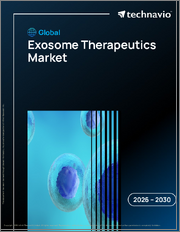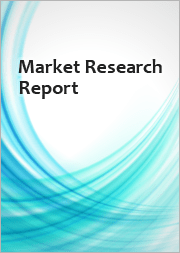
|
시장보고서
상품코드
1881486
엑소좀 치료제 시장 : 세계 산업 규모, 점유율, 동향, 기회, 예측 - 엑소좀 유형별, 공급원별, 치료법별, 용도별, 최종사용자별, 지역별, 경쟁별(2020-2030년)Exosome Therapeutics Market - Global Industry Size, Share, Trends, Opportunity, and Forecast, Segmented By Exosome Type, By Source, By Therapy, By Application, By End User, By Region and Competition, 2020-2030F |
||||||
세계의 엑소좀 치료제 시장은 2024년에 3,263만 달러로 평가되었으며, 2030년까지 CAGR 41.56%로 성장하여 2억 6,258만 달러에 달할 것으로 예측됩니다.
엑소좀 치료는 세포 간 소통을 촉진하고 표적 세포로 생리활성 분자를 운반하는 천연 유래 세포 유래 나노베시클을 활용하는 것으로, 다양한 질병에 대한 새로운 치료법을 제공합니다. 시장 확대는 엑소좀 생물학에 대한 이해의 심화, 첨단 치료법이 필요한 만성질환 및 노화 관련 질환의 증가, 그리고 생명공학 연구개발에 대한 막대한 투자에 의해 근본적으로 뒷받침되고 있습니다.
| 시장 개요 | |
|---|---|
| 예측 기간 | 2026-2030년 |
| 시장 규모 : 2024년 | 3,263만 달러 |
| 시장 규모 : 2030년 | 2억 6,258만 달러 |
| CAGR : 2025-2030년 | 41.56% |
| 가장 빠르게 성장하는 부문 | 천연 엑소좀 |
| 최대 시장 | 북미 |
주요 시장 촉진요인
만성질환, 특히 암 발생률의 증가는 전 세계 엑소좀 치료제 시장의 중요한 촉진제가 되고 있습니다. 엑소좀은 표적 약물전달을 촉진하고 최소침습적 진단을 가능하게 하는 자연적 능력을 통해 현재 치료법의 한계를 극복할 수 있는 새로운 치료 수단을 제공합니다.
주요 시장 과제
임상용 엑솜의 대규모 생산 및 정제에 따른 복잡성과 비용은 세계 엑솜 치료제 시장 확대에 큰 걸림돌이 되고 있습니다. 임상 적용에 필요한 순도와 양의 엑소좀을 얻기 위해서는 고도의 자원 집약적인 공정이 필요하며, 이는 생산 비용을 증가시키는 요인으로 작용합니다.
주요 시장 동향
여기에는 엑소좀의 자연적 특성을 넘어 정밀한 약물전달과 치료 효과 향상을 위한 고유한 능력을 강화하는 적극적인 변형이 포함됩니다. 기업들은 특정 약물을 질병 부위에 직접 운반하는 엑소좀 설계에 집중하고 있으며, 이를 통해 치료 결과를 개선하고 비표적 효과를 최소화하기 위해 노력하고 있습니다.
자주 묻는 질문
목차
제1장 개요
제2장 조사 방법
제3장 주요 요약
제4장 고객의 소리
제5장 세계의 엑소좀 치료제 시장 전망
- 시장 규모 및 예측
- 금액별
- 시장 점유율과 예측
- 엑소좀 유형별(천연, 하이브리드)
- 공급원별(중간엽줄기세포, 혈액, 체액, 기타)
- 치료법별(면역요법, 화학요법, 유전자 치료)
- 용도별(대사성 질환, 종양학, 심장질환, 신경학, 기타)
- 최종사용자별(병원·진료소, 학술·연구기관, 기타)
- 지역별
- 기업별(2024)
- 시장 맵
제6장 북미의 엑소좀 치료제 시장 전망
- 시장 규모 및 예측
- 시장 점유율과 예측
- 북미 : 국가별 분석
- 미국
- 캐나다
- 멕시코
제7장 유럽의 엑소좀 치료제 시장 전망
- 시장 규모 및 예측
- 시장 점유율과 예측
- 유럽 : 국가별 분석
- 독일
- 프랑스
- 영국
- 이탈리아
- 스페인
제8장 아시아태평양의 엑소좀 치료제 시장 전망
- 시장 규모 및 예측
- 시장 점유율과 예측
- 아시아태평양 : 국가별 분석
- 중국
- 인도
- 일본
- 한국
- 호주
제9장 중동 및 아프리카의 엑소좀 치료제 시장 전망
- 시장 규모 및 예측
- 시장 점유율과 예측
- 중동 및 아프리카 : 국가별 분석
- 사우디아라비아
- 아랍에미리트
- 남아프리카공화국
제10장 남미의 엑소좀 치료제 시장 전망
- 시장 규모 및 예측
- 시장 점유율과 예측
- 남미 : 국가별 분석
- 브라질
- 콜롬비아
- 아르헨티나
제11장 시장 역학
- 성장 촉진요인
- 과제
제12장 시장 동향과 발전
- 인수합병
- 제품 출시
- 최근 동향
제13장 세계의 엑소좀 치료제 시장 : SWOT 분석
제14장 Porter's Five Forces 분석
- 업계내 경쟁
- 신규 참여의 가능성
- 공급업체의 능력
- 고객의 능력
- 대체품의 위협
제15장 경쟁 구도
- Aethlon Medical, Inc.
- AEGLE Therapeutics Corporation
- Anjarium Biosciences AG
- Exogenus Therapeutics SA
- Lonza Group AG
- Capricor Therapeutics Inc
- Avalon GloboCare Corp.
- Stem Cell Medicine Ltd.
- Evox Therapeutics Limited.
- EV Therapeutics
제16장 전략적 제안
제17장 조사 회사 소개 및 면책사항
KSM 25.12.16The Global Exosome Therapeutics Market, valued at USD 32.63 Million in 2024, is projected to experience a CAGR of 41.56% to reach USD 262.58 Million by 2030. Exosome therapeutics involve the utilization of naturally occurring, cell-derived nanovesicles that facilitate intercellular communication and deliver bioactive molecules to target cells, presenting novel therapeutic avenues for various diseases. The market's expansion is fundamentally supported by an escalating understanding of exosome biology, the increasing prevalence of chronic and age-related conditions necessitating advanced treatment modalities, and substantial investment in biotechnology research and development
| Market Overview | |
|---|---|
| Forecast Period | 2026-2030 |
| Market Size 2024 | USD 32.63 Million |
| Market Size 2030 | USD 262.58 Million |
| CAGR 2025-2030 | 41.56% |
| Fastest Growing Segment | Natural Exosomes |
| Largest Market | North America |
Key Market Drivers
The increasing incidence of chronic diseases, particularly cancer, serves as a significant driver for the global exosome therapeutics market. Exosomes offer novel therapeutic avenues through their natural ability to facilitate targeted drug delivery and enable minimally invasive diagnostics, addressing limitations of current treatments. This escalating disease burden necessitates innovative solutions that exosomes are uniquely positioned to provide, aiming for improved efficacy and reduced systemic toxicity. According to the International Agency for Research on Cancer, in 2022, there were close to 20 million new cases of cancer worldwide, highlighting the pressing need for advanced therapeutic strategies and emphasizing the expansive patient population that exosome-based therapies could potentially benefit.
Key Market Challenges
The complexity and cost associated with the large-scale manufacturing and purification of clinical-grade exosomes represent a significant impediment to the expansion of the global exosome therapeutics market. Achieving the necessary purity and quantity of exosomes for clinical applications demands sophisticated and resource-intensive processes, which drives up production expenses. This directly hampers the market by delaying the progression of promising therapies from research and development into commercialization. The intricate nature of isolating and purifying exosomes to meet stringent regulatory standards often results in lower yields and higher per-dose costs, making advanced exosome-based treatments less accessible and financially viable for wider adoption.
Key Market Trends
This involves actively modifying exosomes to enhance their intrinsic capabilities for precise drug delivery and increased therapeutic efficacy, moving beyond their natural properties. Companies are increasingly focusing on engineering exosomes to carry specific payloads directly to disease sites, thereby improving treatment outcomes and minimizing off-target effects. For example, Minovacca, a startup incorporated in January 2025, commercializes universal milk exosomes by chemically and genetically engineering them for target-specific delivery of therapeutics, highlighting this directed approach. This scientific progression is underpinned by extensive collaborative efforts; according to the International Society for Extracellular Vesicles (ISEV), its MISEV2023 guidelines, published in December 2023, incorporated feedback from over 1000 researchers worldwide to standardize and advance exosome research methods, a foundational step for effective exosome engineering.
Key Market Players
- Aethlon Medical, Inc.
- AEGLE Therapeutics Corporation
- Anjarium Biosciences AG
- Exogenus Therapeutics SA
- Lonza Group AG
- Capricor Therapeutics Inc
- Avalon GloboCare Corp.
- Stem Cell Medicine Ltd.
- Evox Therapeutics Limited.
- EV Therapeutics
Report Scope:
In this report, the Global Exosome Therapeutics Market has been segmented into the following categories, in addition to the industry trends which have also been detailed below:
Exosome Therapeutics Market, By Exosome Type:
- Natural
- Hybrid
Exosome Therapeutics Market, By Source:
- Mesenchymal Stem Cells
- Blood
- Body Fluids
- Others
Exosome Therapeutics Market, By Therapy:
- Immunotherapy
- Chemotherapy
- Gene Therapy
Exosome Therapeutics Market, By Application:
- Metabolic Disorders
- Oncology
- Cardiac Disorders
- Neurology
- Others
Exosome Therapeutics Market, By End User:
- Hospitals & Clinics
- Academic & Research Institutions
- Others
Exosome Therapeutics Market, By Region:
- North America
- United States
- Canada
- Mexico
- Europe
- France
- United Kingdom
- Italy
- Germany
- Spain
- Asia Pacific
- China
- India
- Japan
- Australia
- South Korea
- South America
- Brazil
- Argentina
- Colombia
- Middle East & Africa
- South Africa
- Saudi Arabia
- UAE
Competitive Landscape
Company Profiles: Detailed analysis of the major companies presents in the Global Exosome Therapeutics Market.
Available Customizations:
Global Exosome Therapeutics Market report with the given market data, TechSci Research offers customizations according to a company's specific needs. The following customization options are available for the report:
Company Information
- Detailed analysis and profiling of additional market players (up to five).
Table of Contents
1. Product Overview
- 1.1. Market Definition
- 1.2. Scope of the Market
- 1.2.1. Markets Covered
- 1.2.2. Years Considered for Study
- 1.2.3. Key Market Segmentations
2. Research Methodology
- 2.1. Objective of the Study
- 2.2. Baseline Methodology
- 2.3. Key Industry Partners
- 2.4. Major Association and Secondary Sources
- 2.5. Forecasting Methodology
- 2.6. Data Triangulation & Validation
- 2.7. Assumptions and Limitations
3. Executive Summary
- 3.1. Overview of the Market
- 3.2. Overview of Key Market Segmentations
- 3.3. Overview of Key Market Players
- 3.4. Overview of Key Regions/Countries
- 3.5. Overview of Market Drivers, Challenges, Trends
4. Voice of Customer
5. Global Exosome Therapeutics Market Outlook
- 5.1. Market Size & Forecast
- 5.1.1. By Value
- 5.2. Market Share & Forecast
- 5.2.1. By Exosome Type (Natural, Hybrid)
- 5.2.2. By Source (Mesenchymal Stem Cells, Blood, Body Fluids, Others)
- 5.2.3. By Therapy (Immunotherapy, Chemotherapy, Gene Therapy)
- 5.2.4. By Application (Metabolic Disorders, Oncology, Cardiac Disorders, Neurology, Others)
- 5.2.5. By End User (Hospitals & Clinics, Academic & Research Institutions, Others)
- 5.2.6. By Region
- 5.2.7. By Company (2024)
- 5.3. Market Map
6. North America Exosome Therapeutics Market Outlook
- 6.1. Market Size & Forecast
- 6.1.1. By Value
- 6.2. Market Share & Forecast
- 6.2.1. By Exosome Type
- 6.2.2. By Source
- 6.2.3. By Therapy
- 6.2.4. By Application
- 6.2.5. By End User
- 6.2.6. By Country
- 6.3. North America: Country Analysis
- 6.3.1. United States Exosome Therapeutics Market Outlook
- 6.3.1.1. Market Size & Forecast
- 6.3.1.1.1. By Value
- 6.3.1.2. Market Share & Forecast
- 6.3.1.2.1. By Exosome Type
- 6.3.1.2.2. By Source
- 6.3.1.2.3. By Therapy
- 6.3.1.2.4. By Application
- 6.3.1.2.5. By End User
- 6.3.1.1. Market Size & Forecast
- 6.3.2. Canada Exosome Therapeutics Market Outlook
- 6.3.2.1. Market Size & Forecast
- 6.3.2.1.1. By Value
- 6.3.2.2. Market Share & Forecast
- 6.3.2.2.1. By Exosome Type
- 6.3.2.2.2. By Source
- 6.3.2.2.3. By Therapy
- 6.3.2.2.4. By Application
- 6.3.2.2.5. By End User
- 6.3.2.1. Market Size & Forecast
- 6.3.3. Mexico Exosome Therapeutics Market Outlook
- 6.3.3.1. Market Size & Forecast
- 6.3.3.1.1. By Value
- 6.3.3.2. Market Share & Forecast
- 6.3.3.2.1. By Exosome Type
- 6.3.3.2.2. By Source
- 6.3.3.2.3. By Therapy
- 6.3.3.2.4. By Application
- 6.3.3.2.5. By End User
- 6.3.3.1. Market Size & Forecast
- 6.3.1. United States Exosome Therapeutics Market Outlook
7. Europe Exosome Therapeutics Market Outlook
- 7.1. Market Size & Forecast
- 7.1.1. By Value
- 7.2. Market Share & Forecast
- 7.2.1. By Exosome Type
- 7.2.2. By Source
- 7.2.3. By Therapy
- 7.2.4. By Application
- 7.2.5. By End User
- 7.2.6. By Country
- 7.3. Europe: Country Analysis
- 7.3.1. Germany Exosome Therapeutics Market Outlook
- 7.3.1.1. Market Size & Forecast
- 7.3.1.1.1. By Value
- 7.3.1.2. Market Share & Forecast
- 7.3.1.2.1. By Exosome Type
- 7.3.1.2.2. By Source
- 7.3.1.2.3. By Therapy
- 7.3.1.2.4. By Application
- 7.3.1.2.5. By End User
- 7.3.1.1. Market Size & Forecast
- 7.3.2. France Exosome Therapeutics Market Outlook
- 7.3.2.1. Market Size & Forecast
- 7.3.2.1.1. By Value
- 7.3.2.2. Market Share & Forecast
- 7.3.2.2.1. By Exosome Type
- 7.3.2.2.2. By Source
- 7.3.2.2.3. By Therapy
- 7.3.2.2.4. By Application
- 7.3.2.2.5. By End User
- 7.3.2.1. Market Size & Forecast
- 7.3.3. United Kingdom Exosome Therapeutics Market Outlook
- 7.3.3.1. Market Size & Forecast
- 7.3.3.1.1. By Value
- 7.3.3.2. Market Share & Forecast
- 7.3.3.2.1. By Exosome Type
- 7.3.3.2.2. By Source
- 7.3.3.2.3. By Therapy
- 7.3.3.2.4. By Application
- 7.3.3.2.5. By End User
- 7.3.3.1. Market Size & Forecast
- 7.3.4. Italy Exosome Therapeutics Market Outlook
- 7.3.4.1. Market Size & Forecast
- 7.3.4.1.1. By Value
- 7.3.4.2. Market Share & Forecast
- 7.3.4.2.1. By Exosome Type
- 7.3.4.2.2. By Source
- 7.3.4.2.3. By Therapy
- 7.3.4.2.4. By Application
- 7.3.4.2.5. By End User
- 7.3.4.1. Market Size & Forecast
- 7.3.5. Spain Exosome Therapeutics Market Outlook
- 7.3.5.1. Market Size & Forecast
- 7.3.5.1.1. By Value
- 7.3.5.2. Market Share & Forecast
- 7.3.5.2.1. By Exosome Type
- 7.3.5.2.2. By Source
- 7.3.5.2.3. By Therapy
- 7.3.5.2.4. By Application
- 7.3.5.2.5. By End User
- 7.3.5.1. Market Size & Forecast
- 7.3.1. Germany Exosome Therapeutics Market Outlook
8. Asia Pacific Exosome Therapeutics Market Outlook
- 8.1. Market Size & Forecast
- 8.1.1. By Value
- 8.2. Market Share & Forecast
- 8.2.1. By Exosome Type
- 8.2.2. By Source
- 8.2.3. By Therapy
- 8.2.4. By Application
- 8.2.5. By End User
- 8.2.6. By Country
- 8.3. Asia Pacific: Country Analysis
- 8.3.1. China Exosome Therapeutics Market Outlook
- 8.3.1.1. Market Size & Forecast
- 8.3.1.1.1. By Value
- 8.3.1.2. Market Share & Forecast
- 8.3.1.2.1. By Exosome Type
- 8.3.1.2.2. By Source
- 8.3.1.2.3. By Therapy
- 8.3.1.2.4. By Application
- 8.3.1.2.5. By End User
- 8.3.1.1. Market Size & Forecast
- 8.3.2. India Exosome Therapeutics Market Outlook
- 8.3.2.1. Market Size & Forecast
- 8.3.2.1.1. By Value
- 8.3.2.2. Market Share & Forecast
- 8.3.2.2.1. By Exosome Type
- 8.3.2.2.2. By Source
- 8.3.2.2.3. By Therapy
- 8.3.2.2.4. By Application
- 8.3.2.2.5. By End User
- 8.3.2.1. Market Size & Forecast
- 8.3.3. Japan Exosome Therapeutics Market Outlook
- 8.3.3.1. Market Size & Forecast
- 8.3.3.1.1. By Value
- 8.3.3.2. Market Share & Forecast
- 8.3.3.2.1. By Exosome Type
- 8.3.3.2.2. By Source
- 8.3.3.2.3. By Therapy
- 8.3.3.2.4. By Application
- 8.3.3.2.5. By End User
- 8.3.3.1. Market Size & Forecast
- 8.3.4. South Korea Exosome Therapeutics Market Outlook
- 8.3.4.1. Market Size & Forecast
- 8.3.4.1.1. By Value
- 8.3.4.2. Market Share & Forecast
- 8.3.4.2.1. By Exosome Type
- 8.3.4.2.2. By Source
- 8.3.4.2.3. By Therapy
- 8.3.4.2.4. By Application
- 8.3.4.2.5. By End User
- 8.3.4.1. Market Size & Forecast
- 8.3.5. Australia Exosome Therapeutics Market Outlook
- 8.3.5.1. Market Size & Forecast
- 8.3.5.1.1. By Value
- 8.3.5.2. Market Share & Forecast
- 8.3.5.2.1. By Exosome Type
- 8.3.5.2.2. By Source
- 8.3.5.2.3. By Therapy
- 8.3.5.2.4. By Application
- 8.3.5.2.5. By End User
- 8.3.5.1. Market Size & Forecast
- 8.3.1. China Exosome Therapeutics Market Outlook
9. Middle East & Africa Exosome Therapeutics Market Outlook
- 9.1. Market Size & Forecast
- 9.1.1. By Value
- 9.2. Market Share & Forecast
- 9.2.1. By Exosome Type
- 9.2.2. By Source
- 9.2.3. By Therapy
- 9.2.4. By Application
- 9.2.5. By End User
- 9.2.6. By Country
- 9.3. Middle East & Africa: Country Analysis
- 9.3.1. Saudi Arabia Exosome Therapeutics Market Outlook
- 9.3.1.1. Market Size & Forecast
- 9.3.1.1.1. By Value
- 9.3.1.2. Market Share & Forecast
- 9.3.1.2.1. By Exosome Type
- 9.3.1.2.2. By Source
- 9.3.1.2.3. By Therapy
- 9.3.1.2.4. By Application
- 9.3.1.2.5. By End User
- 9.3.1.1. Market Size & Forecast
- 9.3.2. UAE Exosome Therapeutics Market Outlook
- 9.3.2.1. Market Size & Forecast
- 9.3.2.1.1. By Value
- 9.3.2.2. Market Share & Forecast
- 9.3.2.2.1. By Exosome Type
- 9.3.2.2.2. By Source
- 9.3.2.2.3. By Therapy
- 9.3.2.2.4. By Application
- 9.3.2.2.5. By End User
- 9.3.2.1. Market Size & Forecast
- 9.3.3. South Africa Exosome Therapeutics Market Outlook
- 9.3.3.1. Market Size & Forecast
- 9.3.3.1.1. By Value
- 9.3.3.2. Market Share & Forecast
- 9.3.3.2.1. By Exosome Type
- 9.3.3.2.2. By Source
- 9.3.3.2.3. By Therapy
- 9.3.3.2.4. By Application
- 9.3.3.2.5. By End User
- 9.3.3.1. Market Size & Forecast
- 9.3.1. Saudi Arabia Exosome Therapeutics Market Outlook
10. South America Exosome Therapeutics Market Outlook
- 10.1. Market Size & Forecast
- 10.1.1. By Value
- 10.2. Market Share & Forecast
- 10.2.1. By Exosome Type
- 10.2.2. By Source
- 10.2.3. By Therapy
- 10.2.4. By Application
- 10.2.5. By End User
- 10.2.6. By Country
- 10.3. South America: Country Analysis
- 10.3.1. Brazil Exosome Therapeutics Market Outlook
- 10.3.1.1. Market Size & Forecast
- 10.3.1.1.1. By Value
- 10.3.1.2. Market Share & Forecast
- 10.3.1.2.1. By Exosome Type
- 10.3.1.2.2. By Source
- 10.3.1.2.3. By Therapy
- 10.3.1.2.4. By Application
- 10.3.1.2.5. By End User
- 10.3.1.1. Market Size & Forecast
- 10.3.2. Colombia Exosome Therapeutics Market Outlook
- 10.3.2.1. Market Size & Forecast
- 10.3.2.1.1. By Value
- 10.3.2.2. Market Share & Forecast
- 10.3.2.2.1. By Exosome Type
- 10.3.2.2.2. By Source
- 10.3.2.2.3. By Therapy
- 10.3.2.2.4. By Application
- 10.3.2.2.5. By End User
- 10.3.2.1. Market Size & Forecast
- 10.3.3. Argentina Exosome Therapeutics Market Outlook
- 10.3.3.1. Market Size & Forecast
- 10.3.3.1.1. By Value
- 10.3.3.2. Market Share & Forecast
- 10.3.3.2.1. By Exosome Type
- 10.3.3.2.2. By Source
- 10.3.3.2.3. By Therapy
- 10.3.3.2.4. By Application
- 10.3.3.2.5. By End User
- 10.3.3.1. Market Size & Forecast
- 10.3.1. Brazil Exosome Therapeutics Market Outlook
11. Market Dynamics
- 11.1. Drivers
- 11.2. Challenges
12. Market Trends & Developments
- 12.1. Merger & Acquisition (If Any)
- 12.2. Product Launches (If Any)
- 12.3. Recent Developments
13. Global Exosome Therapeutics Market: SWOT Analysis
14. Porter's Five Forces Analysis
- 14.1. Competition in the Industry
- 14.2. Potential of New Entrants
- 14.3. Power of Suppliers
- 14.4. Power of Customers
- 14.5. Threat of Substitute Products
15. Competitive Landscape
- 15.1. Aethlon Medical, Inc.
- 15.1.1. Business Overview
- 15.1.2. Products & Services
- 15.1.3. Recent Developments
- 15.1.4. Key Personnel
- 15.1.5. SWOT Analysis
- 15.2. AEGLE Therapeutics Corporation
- 15.3. Anjarium Biosciences AG
- 15.4. Exogenus Therapeutics SA
- 15.5. Lonza Group AG
- 15.6. Capricor Therapeutics Inc
- 15.7. Avalon GloboCare Corp.
- 15.8. Stem Cell Medicine Ltd.
- 15.9. Evox Therapeutics Limited.
- 15.10. EV Therapeutics
16. Strategic Recommendations
17. About Us & Disclaimer
(주말 및 공휴일 제외)


















